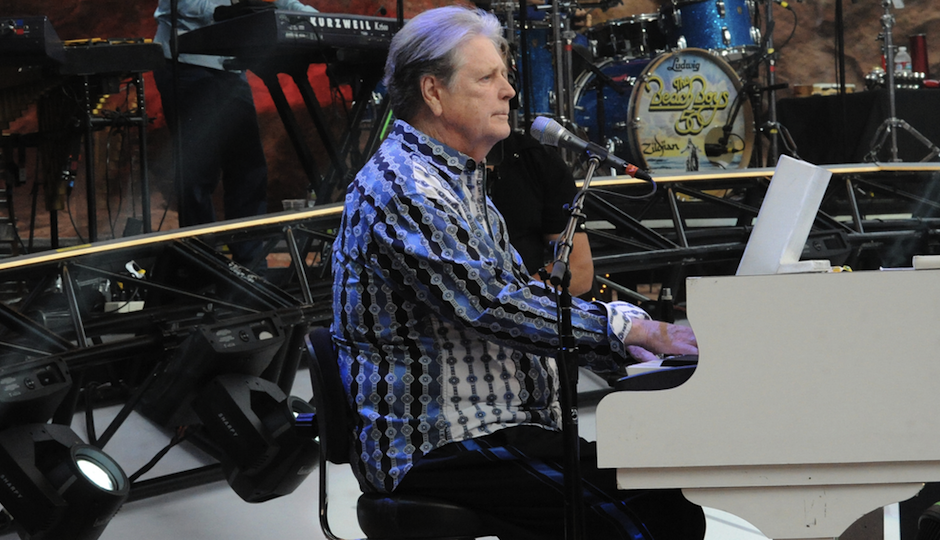My Reverence for Brian Wilson

Via Shutterstock
The first time I heard the album Pet Sounds I was at my friend James’ place in Graduate Hospital, when it was still possible for a struggling actor to live in a communal house with artists and photographers and pay very little rent. We had gone to college together, at Oberlin, where he was in the school’s music conservatory, and we got to know each other when we played father and daughter in a play. I was not in the conservatory—or the “con,” as it was known—but I had con longings. My mother had been a child piano prodigy who studied with Seymour Bernstein (now the subject of an Ethan Hawke documentary), and our home was filled with classical music, and a reverence for it. I took to music easily too, whether sung or played, and I was in countless ensembles and musicals and choirs. Still, I didn’t have the persistence or natural gift that would make me a conservatory student, so I took ad hoc piano lessons at the conservatory and felt a swooning envy of the kids who spent their days and nights immersed in key signatures. Kids like James.
One of the best things about Oberlin was that I was able to meet other students who understood what music meant to me, and who heard it in the same way. So when James—a brilliant musician himself—would recommend something, I knew it would be good. In the case of Pet Sounds, he was appalled I’d reached adulthood without listening to it. “Isn’t it just California surf rock?” I asked.
At this point, James knew where I’d been since college, which is to say, in and out of psychiatric institutions where I’d been given punishing drugs and shock treatments; and living with my parents so I wouldn’t try, again, to kill myself. Though I was living alone now, I was still struggling with the demons of mental illness when James had me sit down on the couch across from two very large speakers and turned off the lights.
Then the music emerged, and no, it certainly wasn’t surf rock. It was…well, everything that can be said has been said about Pet Sounds by now. It was layered and harmonic and complex and bizarre and baffling and exquisite. But more than anything, it spoke the language of my madness. It was as though Brian Wilson, whose vision it was, had somehow unraveled my brain’s chaos and turned it into something beautiful. I knew this instinctively—that there was majesty in the chaos—but sometimes it takes a unique person to translate it into something other than pain. Brian Wilson had that gift: the ability to take the madness and make it sing.
If you want to see what it actually looked like when Brian Wilson made this happen, check out the movie Love and Mercy, now in theaters. It’s divided into two periods of Wilson’s life, one of which is the making of Pet Sounds. It’s amazing to watch but was also hard to sit through, for me, because some scenes hit so close to home. There’s one moment, in particular, when Wilson is sitting at a table having dinner with friends, and he starts to have a distorted perception of that dinner. I have had that same sort of distortion take hold in so many instances; there may be no better way to explain what being “crazy” feels like than watching this film—especially the sudden disconnect between your own experience of reality and that of others around you. The way such distortions manifest as musical genius in the studio is fascinating to watch.
The second part of the film, which was made with Wilson’s cooperation, takes place when he’s older and is involved in an abusive relationship with a therapist. This time in his life is very important to understanding what happened to Wilson—and what happens to many people who are overmedicated or get the wrong kind of treatment for their symptoms. The illness and the treatment for it—even necessary treatment—is often traumatizing, and we are left with deficits and heartache. Yet we soldier on, some of us luckier in that respect than others, and try to do what we once did.
I used to have a metal bookmark with a George Eliot quote: “It is never too late to be what you might have been.” I kept if for years, hoping, then threw it out when I felt I’d been too damaged to come back. But Brian Wilson keeps the faith in his own return to his prior self. He keeps touring. He keeps recording. And he is admirably frank about his mental health challenges, which is immensely useful to those who suffer in silence or shame.
People still react to my affection for the Beach Boys with laughter. They still have misconceptions about Wilson’s drug use. But when I go to see him in concert tonight, I will not see a washed-up old man on an oldies revival tour. I will see a great musician who transformed the mind’s terrible plunder—his, my own, that of countless others—into splendor. And I will pay my respects.
Brian Wilson plays The Mann Center this evening at 7:30 pm. For tickets and more information, click here.


